Juventud Rebelde 221
The New Generations and the Gift of Ubiquity

The New Generations and the Gift of Ubiquity
Diversity of themes, ideological commitment, revolutionary fidelity and overflowing enthusiasm marked the 11th provincial stocktaking Congress of the UJC in Las Tunas
 By Juan Morales Agüero juan@juventudrebelde.cu
By Juan Morales Agüero juan@juventudrebelde.cu
February 18, 2020
Translated and edited by Walter Lippmann for CubaNews.
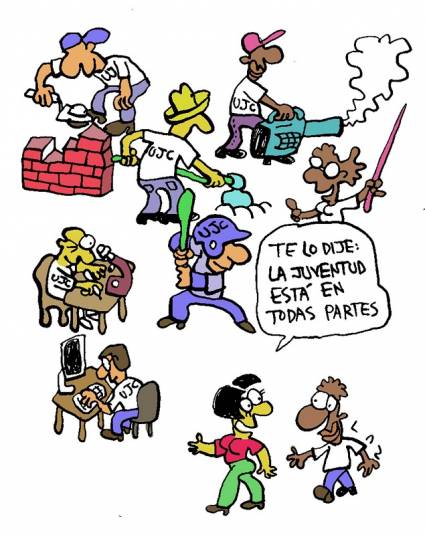 When one attends a youth meeting and listens to its participants discuss the varied and complex palette of issues that color contemporary Cuban society, one appreciates that the word future transcends mere rhetoric to become something accessible and concrete in what they believe in. “Your future, today,” says their motto.
When one attends a youth meeting and listens to its participants discuss the varied and complex palette of issues that color contemporary Cuban society, one appreciates that the word future transcends mere rhetoric to become something accessible and concrete in what they believe in. “Your future, today,” says their motto.
At the 11th provincial stocktaking assembly, the “Future of Cuba. Congress of the Union of Young Communists (UJC) of Las Tunas, he took the microphone and expressed his ideas for a good part of the social spectrum of the territory: students, teachers, peasants, workers, leaders, technicians, religious… It is that the young people of today seem to be in possession of the gift of ubiquity, that which favors being present everywhere at the same time.
This was made clear at the meeting held at the theater of the University of Medical Sciences of the territory, in the presence of José Ramón Machado Ventura, Second Secretary of the Central Committee of the Party; Susely Morfa González, First Secretary of the National Committee of the UJC, and other leaders and guests from different bodies.
Rafael Alberto, a cooperative member from the Jesús Menéndez municipality, revealed the “secret” of how he managed to make his base committee grow with six militants: by making them fall in love with the day-to-day work of the organization. He spoke of the link between the agricultural work on his farm and academic programs, and of Cubasolar’s contribution to taking advantage of renewable energy.
Julio César, a doctor from Majibacoa, spoke of the potential of a grassroots committee to make itself felt within its radius of action: they collaborate in the construction of an old people’s home, work in a productive area, organize circles of interest, and train in the fight against drugs.
Yuniela Comendador González, president of the Martí Youth Movement at the University of Las Tunas, told how they use social networks to disseminate the work of Cuba’s National Hero. So, they called for a selfies contest and uploaded the winning photos to their Twitter and Facebook profiles.
The role of the UJC in these times was the topic addressed by Eduardo Antonio Rondón Martínez, president of the FEU at the University of Medical Sciences. “We militants have the duty to leave prepared in the academic, but also in the political and ideological [sense] And to be willing to go where we are needed once we graduate. And to bring optimism to the communities”.
Elizabeth de la Cruz, from the Construction and Assembly Company, told how militants from her center – and others who are not yet militants – have made voluntary work with the victims one of their calling cards. Even the micro 8 in Santiago de Cuba were some to contribute to the construction of houses. And they also traveled to Havana when the tornado hit several of their communities. In Regla, they left the indelible mark of their solidarity.
Speaking in the discussion, Susely said that “among the admirable things about this assembly is that no comments are like any other, and that there is a correspondence between what they say and what you do every day. We must fight on all fronts. And today social networks are an important front. From that space we must also fight the enemy. And be alert to any sign of manipulation.
For his part, José Ramón Machado Ventura made clear the absolute confidence the Party has in the vanguard youth organization. This is all the more so at the present time when the process is underway. In his words he endorsed what the participants had said, encouraged them to continue and said: “We know we can count on you”.
The assembly constituted the delegation of the province for the final session of the 11th. At the same time, it elected the new Committee and Provincial Bureau of the UJC, at the head of which Anier Arnedo Sánchez was confirmed as the first secretary in the territory.
How to Make a Surgical Face Mask at Home

How to Make a Surgical Face Mask at Home
We also offer you some tips for its use
By Isairis Sosa Hernández isairis@juventudrebelde.cu
March 10, 2020
Translated and edited by Walter Lippmann for CubaNews.

One of its most common applications is when performing surgery, because the patient is exposed to any virus or contaminant. Author: Pinterest Published: 10/03/2020 | 05:34 pm
During this Monday’s special Round Table, where the measures adopted by Cuba to face the threat posed by the rapid and broad international expansion of the new coronavirus were reported, Cuban Prime Minister Manuel Marrero Cruz said that we can be concerned and concerned about the epidemic, but what we really have to do is prepare for an eventual entry of the virus into our country.
So, Así de Fácil wants to show you today how we can make a nasobuco or mask at home and offer you some advice on how to use it.
A piece of cloth and two pieces of elastic is what you will need to make this simple mask. Another model that we also propose, uses only fabric and does not use elastic, as they are usually worn in medical institutions. The images will show you every step.
As I always say, if you have children at home, encourage them to participate in the making of the mask so that they can enjoy how wonderful it is to create something with our own hands. See you next week to continue turning a simple idea into a great solution. Don’t miss out!







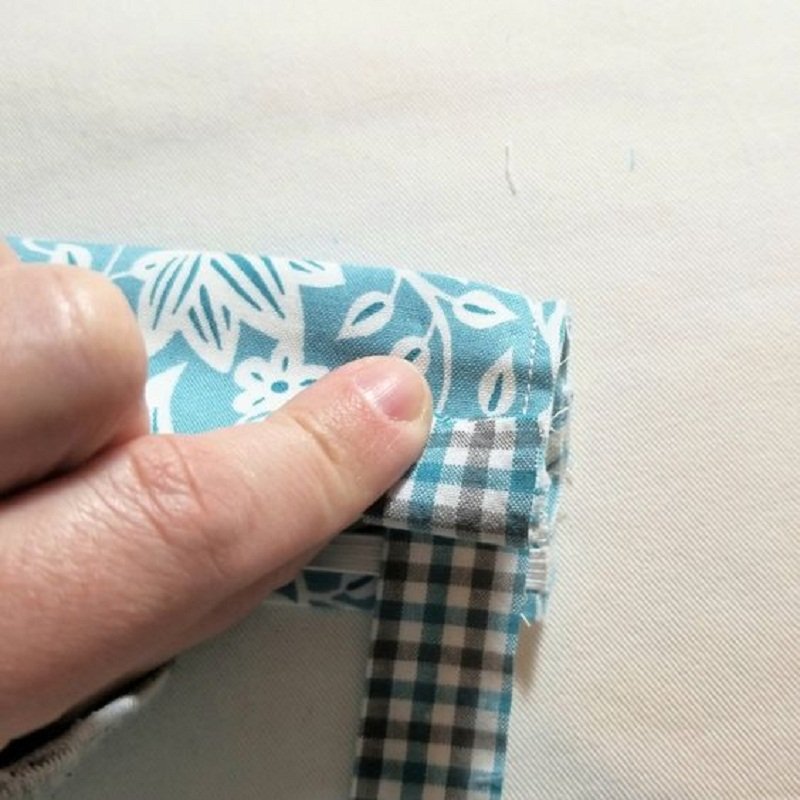




When to use a nasobuco or mask
If you are a healthy person, you only need to wear a mask if you care for someone suspected of carrying the virus.
Also wear a mask if you have a cough or sneeze.
Facemasks are only effective if combined with frequent hand washing.
Putting on and taking off a mask
Before you put on a mask, wash your hands thoroughly.
Cover your mouth and nose with the mask and make sure there are no gaps between your face and the mask.
Avoid touching the mask while you are wearing it.
To remove your mask: take it off from behind, without touching the front.
To reuse it, they recommend ironing it after washing it, as the virus cannot withstand high temperatures.
After handling a used mask, wash your hands immediately.
For a More Inclusive Society

For a More Inclusive Society
The 5th Congress of the Cuban Association of the Deaf takes place at the Havana Convention Center
By Liudmila Peña Herrera
March 4, 2020
Translated and edited by Walter Lippmann for CubaNews.

Cuba offers an inclusive education Author: Taken from the Internet Published: 04/03/2020 | 12:40 am
The demand of the deaf community that Cuban sign language be accepted as an official language, along with Spanish, was evident on the first day of the 5th Congress of the Association of the Deaf of Cuba (ANSOC), which is in session at the Havana Convention Center since Tuesday.
The speakers highlighted the richness of this form of communication, the academic research on its development and the need for families to have the opportunity to study and communicate through it, as it is a symbol of inclusion.
In one of the panels at the conference, aspects related to the linguistics of Cuban sign language and the culture of the deaf community, the methodology for teaching it to children, society’s knowledge of the potentialities and needs of these people, as well as the importance of sign language being protected by law were addressed.
In this sense, Leonardo Pérez Gallardo, professor of Civil Law at the University of Havana, reflected that in its Article 42, the Constitution prohibits any type of discrimination on the basis of disability, and one of the specific manifestations of disability is hearing.
A touching moment was the presentation of the video clip Soy el verso, with music by Telmary, performed in sign language, and the message that the artist sent, from there, to her colleagues: “It is important that society hears the concerns of the deaf community and the efforts made in the country in their favor. I hope that many artists can join in”.
The first day of the Congress was attended by Jorge Cuevas Ramos, member of the Secretariat of the Central Committee of the Party; Marta Elena Feitó Cabrera, Minister of Labour and Social Security; Joseph Murray, President of the World Federation of the Deaf; Fermín Quiñones Sánchez, President of the Cuban Association of the United Nations; and Alejandro Marzo Peña, President of the ANSOC.
The Four-Step Commitment

The Four-Step Commitment of New Young UJC Members
The selection of the first four direct delegates to the 11th Congress of the UJC in Santiago de Cuba shows that every day and from the most diverse fields, the tenacity of the new ones contributes its grain of sand to the forging of the future
By Odalis Riquenes Cutiño
Published: Thursday 20 February 2020 | 05:59:34 pm.
Translated and edited by Walter Lippmann for CubaNews.
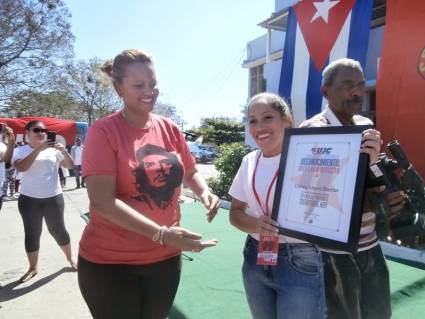
Danay Leyva Barrios, hydraulic engineer and a pillar in the investments of the Provincial Delegation of Hydraulic Resources santiaguera Author: Odalis Riquenes Cutiño Published: 20/02/2020 | 05:55 pm
SANTIAGO DE CUBA.-Wilfredo Valdés Pérez, specialist in quality control at the Hermanos Díaz refinery; Danay Leyva Barrios, hydraulic engineer and a pillar in the investments of the Santiago Provincial Delegation of Hydraulic Resources; Beatriz García Vistel, who is training as an Early Childhood Educator at the Floro Pérez Pedagogical School and Dainier González Romero, fourth-year Telecommunications Engineering student at the Universidad de Oriente, were selected in their respective centers as direct delegates from this eastern province to the 11th Congress of the UJC.
Excited, each in their own way, among the hugs of their colleagues, the joy of their administrative leadership, and the respectful tribute to the merit of those who shared the candidacies with them, they received their credentials and recognition from the hands of the member of the National Bureau of the UJC, Yannara Concepción Domínguez, and reaffirmed their commitment to continue firm and moving forward, contributing to the present and underpinning a better future.
Wilfredo, Danay, Beatriz and Dainier are the faces of continuity and their stories of anonymous and daily devotion, the best evidence that the new Cubans are the protagonists of their time, and in their walk there are guarantees for tomorrow.
A graduate in Chemistry, Wilfredo is the youth leader of the Santiago fuel refinery, a center with a tradition of good work from the UJC and where, united by a shared vision, the Bisoño people are a true vanguard for carrying out any task of high impact or difficulty that may arise.
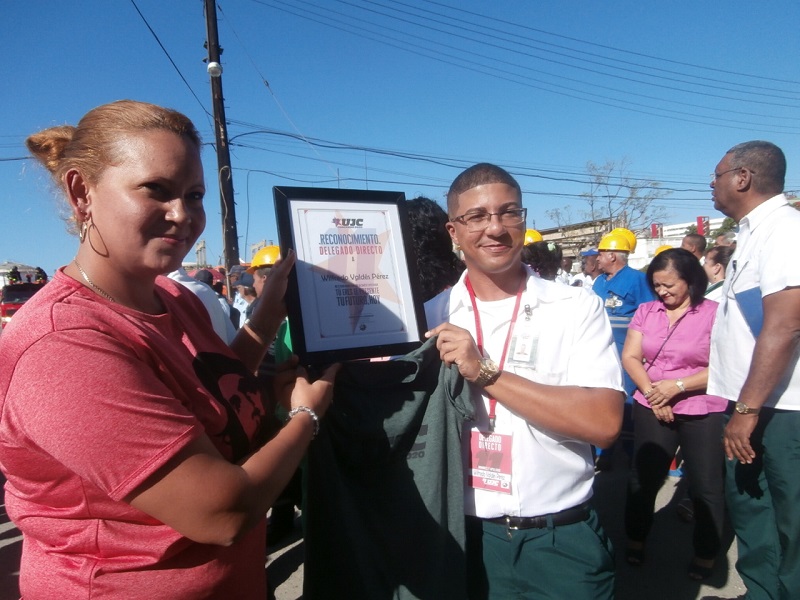
In addition to working long hours in all areas of the plant to secure the fuel demand in eastern Cuba, the novices set the pace if a substation affected by a fire needs to be repaired, a cooling tower needs to be dismantled, or an oil spill threatens the bay.
Danay Leyva Barrios, a specialist in water resource management and development, will raise her voice at the great gathering of the young Cuban vanguard, on behalf of those who from dawn to dusk are wasting sacrifices, whether in new investments, in dealing with drought or in daily water management, without expecting any reward other than a “thank you” from the population that has benefited from the precious liquid.
At only 17 years old and the love for history and children in her warm eyes, Beatriz García Vistel is the living example of the values of the girls who are trained at the Floro Pérez Pedagogical School, a center that has been outstanding at a national level for four consecutive years. There future early childhood educators are prepared, ready to continue the achievements of the Revolution in this sector.
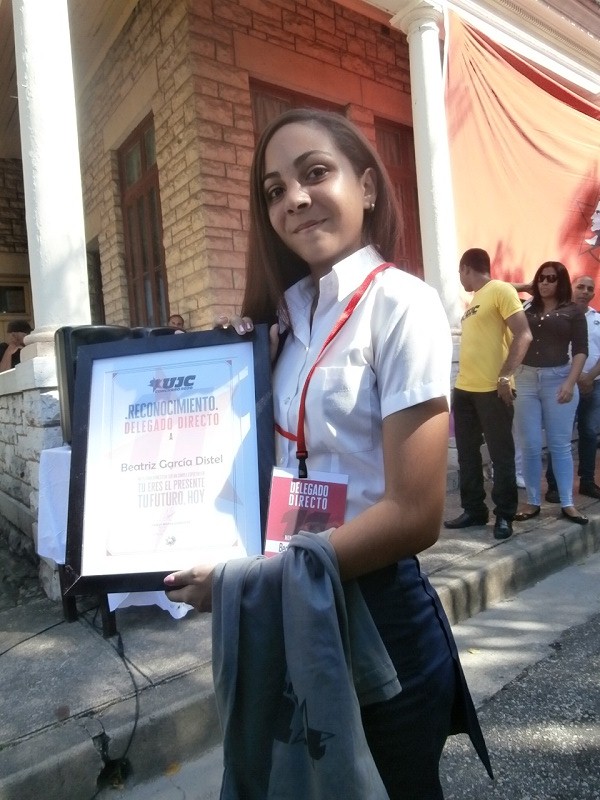
Only two courses away from graduating as a telecommunications engineer from the Universidad de Oriente, Dainier González is already dreaming and striving for a tomorrow where, he says, science, which he is passionate about, and the research that can be generated from academia, will be put to work on the dilemmas of local development.
That is why he already speaks, passionately, of the use of robotics in the development of assisted rehabilitation technologies for patients affected by neurological diseases. This will be his degree thesis, because, in this way, he assures us, he will be at the level of the prepared and committed professionals who are trained in the country.
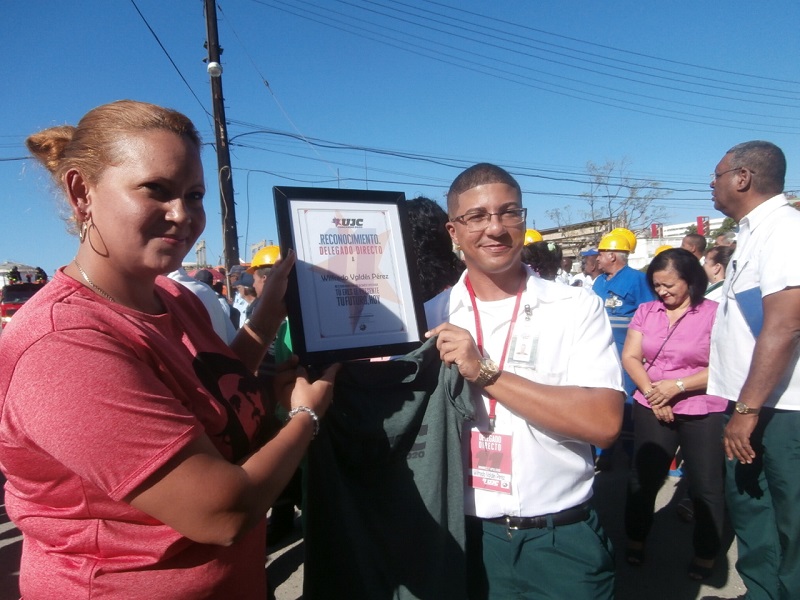
Today they are Wilfredo, Danay, Beatriz, Dainier, four among thousands in Santiago, in Cuba; party lovers, addicted to technology, but also industrious and dedicated, every day and from the most diverse fields, to forging the future of the Homeland.
These are the signs of continuity, real, concrete, beyond any slogan.
Trump’s Trick for Afghanistan Withdrawal

Trump’s Trick for Afghanistan Withdrawal
Published: Saturday 29 February 2020 | 10:53:30 pm.
 By Leonel Nodal digital@juventudrebelde.cu
By Leonel Nodal digital@juventudrebelde.cu
Translated and edited by Walter Lippmann for CubaNews.

Signatories of the Peace Agreement in Afghanistan; Mullah Abdul Ghani Baradar, leader of the Taliban delegation and Zalmay Khalilzad, representative of the United States Author: Reuters Publicado: 29/02/2020 | 10:33 pm
Presidential candidate Donald Trump had to rub his hands together when he learned in detail the real situation of the U.S. war in Afghanistan. That would be a strong campaign theme for him to win the White House.
Trump’s election promise in 2016 would be as close to the national will as possible: to end America’s endless wars abroad.
Barack Obama could not win it, even with the deployment of more than 100,000 soldiers in the Central Asian country between 2010 and 2012, at a cost of 100 billion dollars a year. Better to think of another way out.
The Pentagon had a guarded diagnosis, which the current head of the Defense Department, Mark Esper, recently simplified into a lapidary phrase: the war in Afghanistan is “still” in “a state of strategic impasse. In other words, lost, with no chance of military victory.
The $760 billion spent on the war in Afghanistan from October 2001 to March 2019, plus an additional $240 billion in additional spending, according to official figures, should be honored, but without losing face or completely sacrificing the business it represented for its war industry allies.
The publicity challenge for re-election in 2020 would be to make good on the promise of troop withdrawal from Afghanistan, but keeping up appearances, without winners or losers.
Trump changed the position maintained until then by Washington of refusing to speak directly with the Taliban.
With his high sense of political opportunism and dominance of the publicity show, the only winner of the bloody confrontation would be Trump, the architect of peace.
In October 2018, Trump gave the green light to secret negotiations with Taliban representatives in Doha, the capital of Qatar. In early September 2019, he even prepared – in complete secrecy – a spectacular “end of the war in Afghanistan” ceremony at the presidential residence at Camp David, where historic international agreements were signed.
However, the death of a US soldier in an attack in Kabul on 5 September led to an abrupt breakdown in the negotiations.
The talks “are dead,” he said in a theatrical tone, but without abandoning his secret intentions to resume dialogue.
However, The Washington Post warned last December that Trump was eager to announce the first redeployment of 5,000 troops, which some sources said was already in place, and was pressing for “a complete withdrawal before the 2020 election.
Washington would manage a “reduction of violence” and seal the end of hostilities between the United States and the Taliban. This would be followed by the negotiation of an “inter-Afghan” agreement.
It took 18 months of talks in Doha to end 18 years of war against the Taliban, the longest in U.S. history. On Saturday, February 29, the two sides signed a peace agreement that will pave the way for the withdrawal of U.S. forces from Afghanistan, in exchange for a series of solid guarantees from the Taliban to the United States and its allies.
In his new, revised version of “withdrawal,” released during his trip to India earlier this week, Trump said the United States is trying to reduce its troop levels in Afghanistan to 8,600 and “we will make a decision on what the final outcome will be.”
“We’re not really serving as a military force, but as a police force,” he said, “and we’re not a police force, they (Afghans) have to police their own country.
The president made it clear that even after a possible withdrawal of troops, the U.S. will maintain its presence in Afghanistan. “We will always have intelligence, they will have other things there,” Trump said.
What the president is hiding is that the background to the negotiations has been the pure and simple defeat of the world’s greatest war power. After 18 years of resistance, the Taliban is today stronger than before, with a stranglehold on more than half of the country’s territory.
Afghan President Ashraf Ghani himself said this year that more than 45,000 members of the security forces have been liquidated since he came to power in 2014.

U.S. troops counting the days Afghanistan. Photo: Reuters
Afghanistan’s security force has a shortfall of 79,000 men, and official sources reveal that they are losing troops faster than they can replace them. In addition, the country’s income is insufficient to pay the bill for its own security forces. And that’s a doorway back to the United States.
TheTaliban’s chief negotiator, Sher Mohammad Abbas Stanikzai, who expressed his satisfaction with the peace agreement signed between the United States and the group in Doha, which he called a historic moment for the country.
The agreement was officially signed by Mullah Abdul Ghani Baradar, the deputy leader of the Taliban, and Zalmay Khalilzad, the U.S. special representative for reconciliation in Afghanistan, in the presence of representatives from more than 30 countries, including U.S. Secretary of State Mike Pompeo.
“After 20 years of war imposed on Afghanistan by U.S. and NATO forces, a peace agreement was signed today between the Americans and the Islamic Emirate of Afghanistan,” Stanekzai said, adding, “According to the agreement, all U.S. and NATO forces must leave Afghanistan within 14 months of the signing of the agreement.
Donald Trump is trying to transform a military disaster into a political-diplomatic peace victory, which as of February 15, 2020, left 2,448 U.S. soldiers dead and about 20,500 injured in action.
The damage suffered by the Afghan nation and people due to imperial intervention and the desire to establish a regime submissive to its interests characterizes one of the greatest humanitarian catastrophes in history, with more than half a million civilians killed and tens of thousands injured and wounded.
With next November’s elections in mind, Donald Trump is trying to capitalize on the gruesome U.S. withdrawal from Afghanistan as his own victory and trump card in his quest to screw himself into the presidential seat for four more years.
A Smartphone App called Duolingo

A Smartphone App called Duolingo
Do you like to learn another language? One of the most enjoyable ways is with Duolingo, an application available for iOS and Android, as well as in web format, which allows users to get into the basics of multiple languages
By Yurisander Guevara
February 26, 2020
Translated and edited by Walter Lippmann for CubaNews.
 Do you like to learn another language? One of the most enjoyable ways is with Duolingo, an application available for iOS and Android, as well as in web format, which allows users to get into the basics of multiple languages.
Do you like to learn another language? One of the most enjoyable ways is with Duolingo, an application available for iOS and Android, as well as in web format, which allows users to get into the basics of multiple languages.
Its creators designed the application in a very visual way. “Our short, free lessons are designed to feel more like a game than a study book. Learning is easier when you’re having fun,” they say.
The lessons focus on a real-world goal, such as ordering in a restaurant. Students develop the vocabulary and grammar necessary to achieve that goal through varied reading, writing, listening and speaking practice.
According to its creators, the application has over 300 million users.
New Water Rates Announced

New Water Rates Announced
The new prices should contribute to the saving of the vital liquid in hotel facilities, industries and other centers of the production and services
February 28, 2020
Translated and edited by Walter Lippmann for CubaNews.
New water charges for hydrometric control in the productive or service sector will begin to be applied as of April 1, officials from the Higher Organization of Business Management (OSDE) Water and Sanitation, of the National Institute of Hydraulic Resources, reported in Havana.
According to the Cuban News Agency, the new prices should contribute to saving the vital liquid in hotels, industries and other centers of production and services, many of which have become large consumers, said Marcia Almeida Llanes, director of State Commissioning of the aforementioned OSDE.
She clarified that, in addition to the companies in this group, there are also self-employed workers and cooperatives, especially when some of their activities or businesses require the important natural resource for commercial purposes.
Likewise, she explained that the water supply service will maintain up to the established standard of a cost of 1.55 pesos per cubic meter (m3) for hotels and other tourism entities.
Industries or other productive sectors and commercial facilities of service and offices will have as rates an amount of 4.20 pesos/m3 until its established standard and an increase to 15 pesos/m3 if they exceed 25 percent of the same. However, there are also discount bonuses of up to 35 percent for entities that save below 25 percent of the established standard, said Almeida Llanes.
New Water Rates Announced

New Water Rates Announced
The new prices should contribute to the saving of vital liquid in hotel facilities, industries and other centers of production and services
Published: Friday 28 February 2020 | 12:33:22 am.
By Juventud Rebelde
Translated and edited by Walter Lippmann for CubaNews.
New water charges for hydrometric control in the productive or service sector will start to be applied from April 1, informed in Havana executives of the Higher Organization of Business Management (OSDE) Water and Sanitation, of the National Institute of Hydraulic Resources.
According to the Cuban News Agency, the new prices should contribute to saving the vital liquid in hotels, industries and other centers of production and services, many of which have become large consumers, said Marcia Almeida Llanes, director of State Commissioning of the aforementioned OSDE.
She clarified that, in addition to the companies in this group, there are also self-employed workers and cooperatives, especially when some of their activities or businesses require the important natural resource for commercial purposes.
Likewise, she explained that the water supply service will maintain up to the established standard of a cost of 1.55 pesos per cubic meter (m3) for hotels and other tourism entities.
The industries or other productive sectors and commercial facilities of service and offices will have as rates an amount of 4.20 pesos/m3 until its established standard and an increase to 15 pesos/m3 if they exceed 25 percent of the same. However, there are also discount bonuses of up to 35 percent for entities that save below 25 percent of the established standard, said Almeida Llanes.
Bread, Salt, and Everything Else

Bread, Salt, and Everything Else
 Published: Thursday 27 February 2020 | 11:48:01 pm. Updated: Friday 28 February 2020 | 12:16:12 am.
Published: Thursday 27 February 2020 | 11:48:01 pm. Updated: Friday 28 February 2020 | 12:16:12 am.
By Yoerky Sánchez Cuéllar
Translated and edited by Walter Lippmann for CubaNews.
The pressure valve resonates and they keep adding fuel to the fire. Let the pot explode. This is what the American circles of power want every time they announce a perverse measure against this small archipelago which, at the cost of sacrifice and resistance, pays the price of being independent.
My generation was born under the effects of the blockade. Perhaps at that time its economic impact was not so visible, thanks to the mutually advantageous relations and agreements established with the socialist camp. Until I was seven years old I fully enjoyed my childhood, playing bowling or watching dolls and adventures in an old Krim 218 at the house of my friends in the neighbourhood. But then the 1990s came and the scene took a traumatic turn.
The fall of Soviet socialism cracked our economy and left it without 80 percent of its foreign trade. Transportation collapsed, factories were shut down, “gossip” lamps replaced incandescent bulbs during long hours of scheduled blackouts.
In the face of the irresistible heat, people slept on the rooftops, with their mattresses uncovered. Publications disappeared. Juventud Rebelde, for example, changed its daily frequency to a weekly newspaper. Faced with a shortage of soap, I remember my mother washing with maguey fibres. Chinese bicycles became fashionable… At that age I couldn’t really understand what was going on around me.
In the book No hay que llorar (Let’s not cry), Santa Clara writer Aristides Vega Chapú compiled testimonies from 34 Cuban authors about this period. About the difficulties of that time and how we overcame the onslaught, each Cuban can tell his own story of ingenuity and resistance. The work would be a book of many volumes.
During all this time, what was the “help” of the American rulers? Was their intention to extend their hand so that the people would overcome the crisis?
In July 1991, months before the “de-escalation,” the U.S. Senate passed several amendments imposing a number of conditions on the Soviet Union to be eligible for U.S. foreign aid. These requirements included the cessation of military and economic assistance to Cuba.
And in 1992 the US government, led by Bush senior, signed the Torricelli Act, after the Democratic candidate, William Clinton, publicly endorsed it as a result of an agreement with Jorge Más Canosa, president of the Cuban American National Foundation. The objective: to asphyxiate us economically in order to provoke social chaos and, consequently, to overthrow the political order established on the island. Illusioned by a supposed domino effect, they openly proclaimed “the end of history” for the “Castro regime”.
In that same year, the Office of Foreign Assets Control (OFAC) prohibited third-country nationals from introducing tobacco and rum from Cuba into the United States, even when these were for personal consumption. They had not yet approved the unfortunate Helms-Burton Act of 1996.
In their speech on humanitarian aid to the Cuban people, they always put one condition in advance: “If Cuba holds totally free and fair elections under international supervision, respects human rights and stops subverting its neighbors, we can hope that relations between our two countries will improve significantly,” are the words of the Assistant Secretary of State for Inter-American Affairs, in March 1990.
Thirty years later, the goals remain the same. We are asked to make political concessions as a condition for taking the pressure off the pot. In the face of Cuba’s dignified and unchanging stance, they resort to arrogance and overkill. These incluse the 85 aggressive measures of various kinds that they applied only in 2019 and which have been rejected by our people and by many in the world, who also suffer the consequences of imperial arrogance.
The writer Eduardo Galeano illustrated this act of genocide with an emphatic and sentimental style: “The blockade against Cuba has multiplied over the years. A bilateral affair? So they say; but nobody ignores that the US blockade implies, today, the universal blockade. Cuba is denied bread and salt and everything else. And it also implies, although many people ignore it, the denial of the right to self-determination. The asphyxiating siege around Cuba is a form of intervention, the most ferocious, the most effective, in its internal affairs.
In the face of this policy of permanent aggression, made worse by the Trump administration and his perverse advisors, aim9ing to make the pot explode, the best response from every Cuban is to do things right. And that the result of daily work neutralizes every plan that the enemy cooks up. In short, “emancipate ourselves by ourselves and with our own efforts,” as Fidel explained it to us in his concept of Revolution.
The Sociological View

The Sociological View
Published: Saturday 22 February 2020 | 09:03:07 pm.

By Graziella Pogolotti
Translated and edited by Walter Lippmann for CubaNews.
Grounded in the Industrial Revolution, with the invention of the steam engine, mass production and the resulting competitive drive to ensure the dominance of the world market had its effects, at an accelerating pace, on the life of society. The soot was invading everything. Cities began to grow rapidly. The proletariat was constituted as a social class. The dizzying change had repercussions on the rise of the social sciences. History changed its perspective, the economy became an indispensable reference point, psychology, anthropology and sociology acquired autonomy. The latter permeated other disciplines with its influence.
With the cost of paper now down, the press has a new reading public. It introduced the soap opera into its pages. It was the antecedent of the current soap opera [telenovela]. With the emergence of creative literary giants, narrative reached an unprecedented peak. First, social romanticism and later the proliferation of “costumbrismo” (local color), the latter spread through the novel, sharpened the sociological outlook. The characters moved in a specific context.
The historical perspective left the past behind to shape the approach of the present. The contradictions in everyday life and the exacerbation of individualism in the struggle to survive, to accumulate power and fortune and to move up the social ladder came to the fore. Little read today, Dickens became a bestseller of that time by showing the drama of helpless childhood in the city environment, captured by crime and victim of the debtors’ prison that punished them along with their parents. Balzac warned about the domination of the financial world, enriched by usury and the consequent disappearance of the small merchant. Emile Zola, A French writer preferred by the cigar factory lectors [workers who read live to cigar workers] wanted to systematize the analysis. He articulated the sequence of his novels to a family genealogy that allowed him to focus each of them on a specific sector of reality.
In one of his novels, Zola examines the seduction exerted on women by the emergence of the first department stores. In accordance with the traditional division of labor, women are responsible for taking care of domestic chores, but they also take on the responsibility of buying what is necessary for the home. Pressed by a concrete need, they turn to the dazzling display case that offers all sorts of temptations. To the purchase of the indispensable, they add the dispensable, with the apparent advantage of having a credit card. Not having to take money out of their purse, they lose track of what they have spent. They fall into debt that, in the end, will be unpayable. It was the original cell of the policy of encouraging consumerism, unleashed more than half a century later, a way of avoiding the overproduction crises characteristic of capitalism through the constant increase in demand, with its depredatory effects on the planet’s goods.
Like history and psychology, sociology became a science. It opened up perspectives that went beyond the field of specialists,. It influenced so-called investigative journalism and can help shape the outlook of better-informed citizens. This approach to reality rethought the complex nature of the link between the individual and society. Considered as a subject of history, human beings build their life expectations from a set of determining factors, among which are class roots, family environment and the education system.
Other factors act on the consciousness of each one, among which the media, entertainment, the use of free time and the formation of paradigms stand out. Some time ago, in the miserable favelas, where the essential was lacking, the television antennas were pointed out. Now, in a similar context, cell phones are everywhere. They offer escape routes, projected towards an illusory world that is not their own. The proposal of models of careers towards individual success replaces the image of a virtuous life in the struggle to transform reality for the benefit of all.
It is often forgotten that among the founders of historical science were Marx and Engels, who put knowledge at the service of the emancipatory revolution. The hegemonic power understood the scope of this way of exploring reality and finding the formulas to intervene in it by operating on human subjectivity. Politics has to strengthen the essential revolutionary condition of the sciences devoted to the study of society, a living and therefore changing phenomenon. It is an urgent demand to calibrate in its right measure the concreteness of the facts, without diluting them in vague generalizations. In the demands of the “wretched of the earth” lies the preservation of the future of humanity. Because once the reserves of the tiny Earth are exhausted, it will have no other planet to inhabit.
Subscribe to Blog via Email
| M | T | W | T | F | S | S |
|---|---|---|---|---|---|---|
| 1 | 2 | 3 | 4 | 5 | 6 | 7 |
| 8 | 9 | 10 | 11 | 12 | 13 | 14 |
| 15 | 16 | 17 | 18 | 19 | 20 | 21 |
| 22 | 23 | 24 | 25 | 26 | 27 | 28 |
| 29 | 30 | |||||



You must be logged in to post a comment.